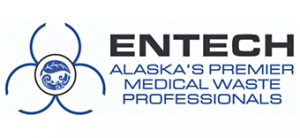In 1991, the Occupational Safety and Health Administration (OSHA) established the Bloodborne Pathogen Standard to protect workers from the risk of exposure to bloodborne pathogens, including the Human Immunodeficiency Virus (HIV/Aids) and the Hepatitis B Virus (HBV). While protection from these specific viruses is of great importance, these two examples represent a portion of the many pathogenic materials that potentially exist in this regulated waste stream. As a result, all medical wastes should be managed in a manner that offers the greatest protection possible to protect both the individuals and the environment which may come into contact with medical waste pathogens.
According to the World Health Organization (WHO), key facts regarding the worldwide generation of medical waste include:
- Of the total amount of waste generated by health-care activities, about 85% is general, non-hazardous waste (i.e. non-regulated refuse).
- The remaining 15% is considered hazardous material that may be infectious, toxic, or radioactive.
- Every year an estimated 16 billion injections are administered worldwide.
- Health-care waste contains potentially harmful microorganisms, which can infect hospital patients, health workers, and the general public if not properly managed.
- Health-care waste in some circumstances is incinerated, and dioxins, furans, and other toxic air pollutants may be produced as emissions.
With these facts in mind, medical waste generators retain important responsibilities to ensure that all pathogens which may be generated through healthcare activity be properly managed. Among those previously mentioned, medical waste pathogens that can be found in generated medical wastes include:
- Human Immunodeficiency Virus (HIV/Aids)
- Hepatitis B (HBV) and Hepatitis C
- Influenza
- Tuberculosis
- Pneumonia
- Arboviral Pathogens
- Brucellosis
- Creutzfeldt-Jakob Pathogens
- Leptospirosis
- Candidiasis
- Malaria
- Rabies
- Herpes
- Syphilis
- Tularemia
- Lassa and Marburg Pathogens
- Viral Hemorrhagic Pathogens
Exposure to these particular pathogens presents risks which, if not properly managed at the point of generation and though waste management activity completed by your medical waste disposal provider, can result in some of the following impacts:
Parasitic Infections
Parasites can be both hardy and prevalent in the medical waste stream, particularly from wastes generated at laboratories or other locations which routinely test for infectious microorganisms.
Bacteremia
Bacteremia infections occurs when bacteria are introduced to the bloodstream. These types of infections are most commonly related to sharps waste. This is one of the main reasons why all sharps are to be placed in puncture resistant containers.
Vaccine Contamination
While vaccines protect us from a multitude of diseases, several consist of actual pathogens designed to stimulate the immunize system to naturally produce resistance to certain microorganisms. If improperly managed, potential exists for individuals to develop infections through exposure to vaccines discarded with medical wastes.
Lung Infections
Improperly stored and/or sealed medical waste can release airborne pathogens that can cause certain lung infections such as tuberculosis.
Meningitis
Medical waste may contain pathogens that can transmit meningitis which is an inflammation of the protective membranes covering the brain and spinal cord.
Sexually Transmitted Infections
Medical wastes can commonly include items used with patient care that have been exposed to sexually transmissible pathogens such as herpes, human papilloma virus, and syphilis among others.
Fevers
Ebola and Marburg disease are two examples of pathogens which cause violent fevers and internal hemorrhaging. While these diseases have a low prevalence in North America, Alaska’s tourism industry has the potential impact of bringing some of these specific pathogens into our medical waste stream.
To ensure that your practice is managing the risks associated with medical waste pathogens with confidence, be sure to work with a service provider you trust and one that maintains a commitment to safety. Contact Entech today to learn more about how we can support medical waste disposal best practices at your office.


